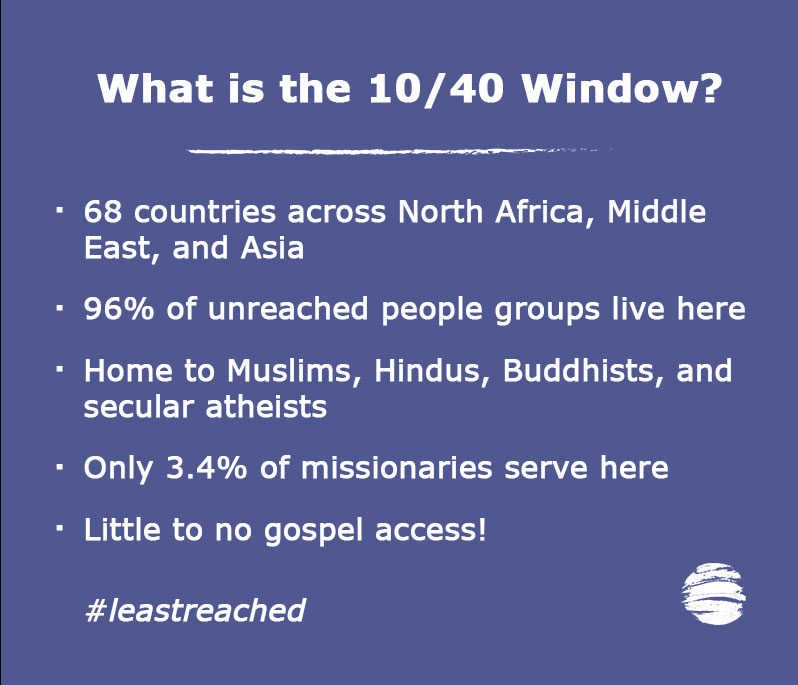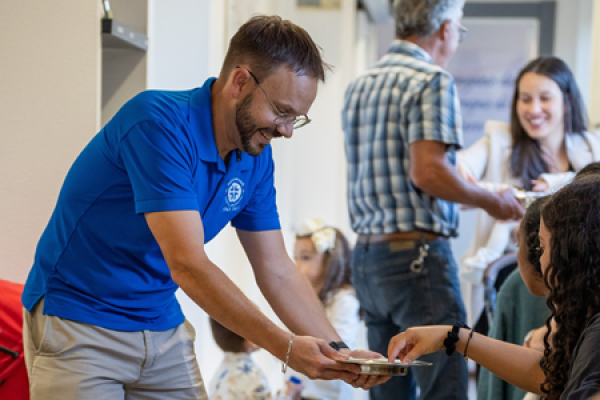
What is the 10/40 Window and how can we reach it?
I remember standing in a small shop in New Delhi, India, talking to the owner about Jesus. “This guru, Jesus, that you speak of, does he live near here?” he asked me. “How can I meet him? Why have I not heard of him before?” His barrage of questions made an inconceivable reality hit home in that moment: The gospel has not yet reached the whole world.
How could it be that a man in one of the largest cities in the world has never heard the name of Jesus? For me, this man represents the plight of “unreached people,” or people who have little or no access to the gospel.
Today there are approximately 7,246 unreached people groups with a total population of 3.39 billion unreached people around the world. That’s 3.39 billion people — a number beyond our comprehension — who, just like the Indian man, have never heard the name of Jesus and have no hope for eternal salvation.
How can this be?

 Considering missions? Download our free guide, “Am I Called to Missions?” to help you discern God's leading.
Considering missions? Download our free guide, “Am I Called to Missions?” to help you discern God's leading.

Is unreached the same as unevangelized?
Who are the 3.39 billion people that make up the unreached people groups? What makes them different from people who are considered unevangelized?
Missiologist Ralph Winter first coined the term “unreached peoples” some 50 years ago, referring to a people group with little or no access to the gospel. The Joshua Project defines unreached as having less than 5% Christian adherents and less than 2% evangelicals. It is this lack of opportunity to hear the gospel that separates unreached peoples from unevangelized people.
An unevangelized people group may also have a large percentage of people who do not know Jesus or have never heard the gospel, but there are enough Christ-followers and churches that people have opportunity to hear.
For example, people who live in my community may not have heard the full gospel, but they likely know someone who is a Christian and there is a church in the neighborhood. To put it another way, they live in close proximity to the gospel.
Unreached people, in contrast, do not live in close proximity to the gospel. There are no neighborhood churches, and they may have never even met a Christian.
If that’s the case, where in the world are they located?
What is the 10/40 Window?
The majority of unreached peoples (96%, in fact) live in an area called the 10/40 Window, coined by Luis Bush in 1989. The 10/40 Window, the region between 10 and 40 degrees north latitude, includes 68 countries across North Africa, the Middle East, and Asia, and is home to Muslims, Hindus, Buddhists, and secular atheists.
Besides lack of gospel access, the 10/40 Window also suffers from deep poverty, religious persecution, limited education and healthcare, and human trafficking. Without the presence of the gospel, people are failing to thrive both physically and spiritually.
That’s why we as the church must spread the gospel to the 10/40 Window. How are we doing so far?
How many missionaries go to the unreached?
Despite the 10/40 Window having the largest population of people who need the gospel, very few missionaries go there. Only 3.4% of missionaries are serving among unreached peoples; the other 97% serve in areas where the gospel is readily accessible.
Similarly, only 1.7% of money given to missions goes to missionaries working among unreached people groups. For every $100,000 Christians make, they give only $1.83 to reaching people in the 10/40 Window.
I don’t mean to say we should stop sending missionaries to reached countries or that we should give less to our home churches. Rather, we should be sending missionaries to the reached and especially to the unreached! We should be giving to our churches and to frontier missionaries!
Using everything at our disposal to spread the gospel in places where Christ is not known is the greatest sacrifice we could make.
What will it take to reach the 10/40 Window?
Because unreached people do not live in proximity to a church or many (if any) believers, we must get serious about making the gospel accessible to them. Nothing less than a unified, fervent commitment from the global body of Christ will allow us to complete the Great Commission to make disciples of all nations — including those in the 10/40 Window.
The church must:
- Take a revolutionary approach to prayer.
- Commit to making the Word of God available.
- Fervently send messengers from all professions.

Using everything at our disposal to spread the gospel in places where Christ is not known is the greatest sacrifice we could make.
1. Take a revolutionary approach to prayer.
Missionary Samuel Zwemer (1867-1952), known as the “the Apostle to Islam,” once stated, “The history of missions is the history of answered prayer.” If we are to see the kingdom of God grow among the 10/40 Window, it will be the direct result of a movement of prayer among the church.
We must commit to praying as though a spiritual battle rages — because it does (Ephesians 6:12). It is only through prayer that we can fight the spiritual strongholds of the enemy. “For though we walk in the flesh, we are not waging war according to the flesh. For the weapons of our warfare are not of the flesh but have divine power to destroy strongholds” (2 Corinthians 10:3-4, ESV).
Will you commit to praying for the unreached? Here’s a prayer guide for the nations.
2. Commit to making the Word of God available.
The Bible is God’s message to the world, and the gospel is called the very power of God (Romans 1:16). Why must the church invest in getting the Scriptures into the hands of every people group? Because it is the Word of God that gives birth to transformational faith. The apostle Paul said, “Faith comes from hearing, and hearing through the word of Christ” (Romans 10:17, ESV).
Only God’s truth can penetrate the darkness. What could be more transformational than the message from God, his written Word, in someone’s heart language? See the impact of Bible translation in this video from Brazil.
Although approximately 70% of the population of the 10/40 Window comes from oral cultures, there are creative ways, such as film and audio, to communicate the Word of God. Yet the final authority is the Bible itself. By giving unreached people access to the Bible, we give them access learn about God for themselves, rather than depending on “cultural outsiders telling them what God’s words say and what they mean.”
Will you commit to investing in Bible translation? Check out organizations like Wycliffe, Jesus Film Project, and Faith Comes By Hearing.

Reaching the unreached people in the 10/40 Window will take fervent prayer, Bible translation, and disciple-makers from all professions.
3. Fervently send messengers from all professions.
Reaching the unreached will also require the messenger, or missionary. Prayer, the message, and the messenger — all three are vital to reaching the billions of people in the 10/40 Window and beyond who have little or no access to the gospel of Christ.
Here’s how the apostle Paul explains it:
“How then will they call on him in whom they have not believed? And how are they to believe in him of whom they have never heard? And how are they to hear without someone preaching? And how are they to preach unless they are sent? As it is written, ‘How beautiful are the feet of those who preach the good news!’” — Romans 10:14-15, ESV
For unreached people to respond to the gospel, they must first hear the gospel. And for them to hear the gospel, someone must tell them. And for there to be a messenger, someone must send them.
If the church is going to not simply participate in the Great Commission but seek to finish the task, then we must commit to sending messengers to the 10/40 Window.
If the church is going to not simply participate in the Great Commission but seek to finish the task, then we must commit to sending messengers to the 10/40 Window.
Perhaps you’ll say that the countries in the 10/40 Window do not allow missionaries, and you’re right. But has not God raised up men and women of faith in other professions who would be welcomed by these countries? The Western church is full of potential messengers in education, business, healthcare, the arts, and the trades, who have a heart for disciple-making but who have never considered taking their profession to the nations for the sake of the gospel.
We must think differently about who to send and mobilize the whole body of Christ. If we do, imagine how many more messengers we could send and how many more unreached people they could reach.
Will you to commit to considering your role in sending or going?
What would it mean for the unreached?
If the church will rise to its calling and commit to pray fervently, make the Word of God available, and send messengers from all professions, then the 3.39 billion unreached peoples of the world will no longer live without access to the gospel. There would be no least-reached. That’s the vision we at Crossworld pursue. Join us.
Did my business friend in New Delhi trust in Christ because he heard the good news that day? I don’t know. But I do know he had access to the message and a messenger because of the fervent prayers of the saints. The rest is between him and God.
 Mark Silvers served with Crossworld in the Philippines for 10 years and joined the Recruitment team in 2009. Mark’s driving passion is to reach the 3.4 billion people in the world today with no access to the gospel.
Mark Silvers served with Crossworld in the Philippines for 10 years and joined the Recruitment team in 2009. Mark’s driving passion is to reach the 3.4 billion people in the world today with no access to the gospel.

 Considering missions? Download our free guide, “Am I Called to Missions?” to help you discern God's leading.
Considering missions? Download our free guide, “Am I Called to Missions?” to help you discern God's leading.
.png)

 By Crossworld
By Crossworld











